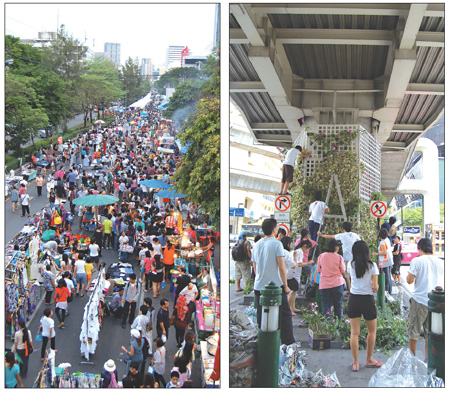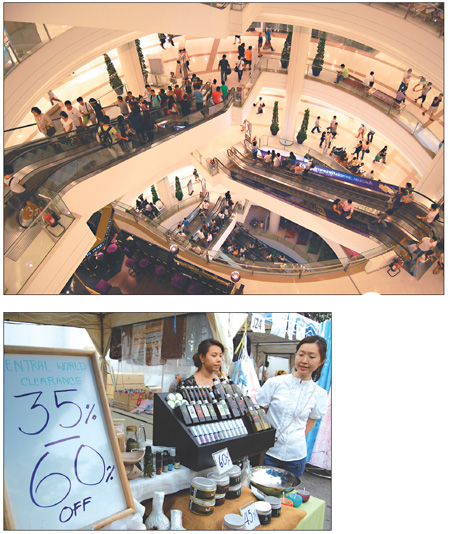Bangkok emerging from the rubble
Updated: 2010-06-23 07:46
By Fu Lei(HK Edition)
|
|||||||
Relative calm finally has returned to the streets of Thailand's capital. Many popular tourist spots remain in ruins, but that has not deterred eager tourists from Hong Kong who need their Thailand 'fix' every few months. Fu Lei reports.
Bangkok, one of the world's most exotic cities, dotted with magnificent Buddhist temples, ancient buildings and fine restaurants, once more steps from the ruins of political unrest, ready to greet the world.
Such is the allure of Bangkok that among the first group tours to return to the city came from Hong Kong. Hongkongers often think of Thailand as their back garden. The "We Love Thailand" tour, sponsored by Wing On Travel Agency, sold out "not in a day but in a few hours as it has been too long for them since their last visit," a customer service officer said of the tour group.
Bangkok with its fine foods, relatively cheap but exotic hotels possesses an enduring charm for people from Hong Kong who want to get away from the cramped living conditions back home.
The "We Love Thailand Tour" left Hong Kong on June 3, only "hours" after the Hong Kong government lowered the travel warning on Bangkok from "black" to "red."
A red alert is not welcome for most travelers but under a black alert, travel insurance becomes invalid. But these returnees to Bangkok couldn't wait to get there.
The returning travelers from Hong Kong found much changed and a city that still is hurting.
Central World, once Southeast Asia's second largest shopping complex and an "essential" for foreign shoppers visiting the city, today stands as a haunting scar on the skyline. The place that had been the pride of Bangkokians and the most popular site for foreigners was torched by anti-government protestors on May 19.
The tourists from Hong Kong shared the dismay of local folk over the ruin in the city's central shopping district.
The first time Puchita Muangnil passed by the ruins of Central World, she cried. "I still remember the glass and the mirrors. That's the place where I used to hang around with friends," said Muangnil, a Thammasat University graduate working in Bangkok for a property company.
One day she gathered with friends at the major shopping district once occupied by protesters, volunteering to decorate pillars of an overpass with plants, as part of the campaign called for by Sukhumbhand Paribatra, Bangkok governor, to refurbish the city and return the smiles.
"We need to forgive, forget and then go forward," said Muangnil.
Logos with the motto "Together We Can" and a heart-shaped Thai flag could be seen everywhere: on youngsters' T-shirts, posters and music video played repeatedly in elevated trains plying the heartland of the city. A full restoration was under way.
One block away from the wreck of Central World, Arunrath Sawatyanon, who once ran a shop in that high-end shopping mall selling healing essential oils and other products for aromatherapy, now has her new counter - or stall, actually. The government turned one side of two-way Henri Dunant Road into a makeshift street market during the weekend for 700 riot-affected shopkeepers.
Sawatyanon must have felt a stark contrast between her counter in the glittering building and this shoddy stall that stands in a temporary tent vulnerable to sudden downpours during the coming rainy season. But the rental exemption would somewhat offset her clearance discount that ranged from 35 percent to 60 percent.
"Our high-quality products are not for the domestic market. We sell them to overseas customers," said Sawatyanon. A tiny jar of essential oil named Siam Myth with a price tag of 1,125 Baht, or HK$270, was repriced to 450 Baht, or HK$108 - a 60 percent discount.
With the help of generous discounts, her daily turnover slid slightly from 10,000 Baht to 8,000 Baht. The government had, in addition, granted her six months' use of an underground store rent free, so that she might move back to the renewed Central World in the first of three planned phases.
While the remains of Central World were surrounded by metal panels and thank-you signs erected in front of its most devastated part, adjacent shopping malls reopened, embracing tourists from all over the world. Siam Paragon, whose glass-panel wall suffered minor damage on May 19, again bustled with shoppers from Western and Asian countries, drawn by its glamorous stores, multiplex theatres and aquarium.
Near Khao San Road where most Western backpackers stay when they travel to Bangkok, strings of small flags of Thailand flew over redecorated streets. Scars on the walls of two-storey shops and bullet holes on a metal rolling door are the only clues indicating a gunfight erupted on April 10, claiming 25 lives.
"Such is the character of protests in Thailand. Most people just sit in at some area and do not smash and grab all over the city. So every time after unrest the city always restores quickly. Western tourists have known about this well and they are coming back," said Sa-nguan Khumrungroj, a Thai freelance journalist.
The Hong Kong tour group remained in the Thai capital only for a day and a night before pushing on to the beach at Pattaya.
Outside Bangkok little disturbance occurred. "Pattaya was most affected besides Bangkok," said Roger Wu, a Hong Kong specialist in Thai tourism. Wu has published over 20 books on Thailand and has been active on various tourism TV programs and websites.
Pattaya has no international airport of its own so Bangkok serves as its gateway of the vicinity. Remembrances of how Bangkok's international airport was occupied by yellow-shirt protestors in 2008, stranding some 3,000 passengers, still haunted the tourists. The number of visitors to Pattaya fell sharply during this spring's protests, according to Wu.
"Another problem is the effectiveness of travel insurance, which cannot protect the policyholder during the black alert. So Hong Kong travel agencies cancelled tour groups after the government issued a black alert," said Wu.
One travel agency received 400 calls about tours to Hong Kong on the day that it reopened bookings for tour packages to Thailand, according to Wu.
"As long as there are no serious matters in the short term, tourism in Bangkok will recover soon," Wu said. But he had to revise his travel guide Roger's Bangkok Bible, as a number of shops mentioned in the book had been burnt or closed.
A week after the Hong Kong government lowered the tourist alert to red, it lowered it a second time to yellow, cautioning visitors to monitor the situation in Thailand and exercise caution while visiting the country.
|
Top: Siam Paragon in Bangkok is again full of shoppers from Western and Asian countries. Above: Arunrath Sawatyanon (right) holds a clearance sale. Below left: One side of Henri Dunant Road is made a special weekend market for the riot-affected citizens. Below right: Volunteers decorate a pillar of an overpass in the major shopping district of Bangkok. |

(HK Edition 06/23/2010 page2)
